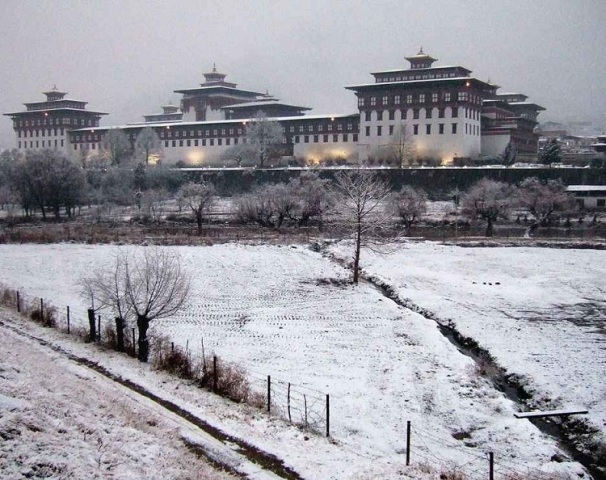Bhutan is a landlocked country in the Himalayas, which shares its borders with India and China. With this article, know some fun & interesting facts about Bhutan.
Facts About Bhutan
A landlocked country in South Asia, Bhutan is regarded as the one of the most isolated nations in the world and is a constitutional monarchy. The largest city of Bhutan is Thimpu which is also the national capital and is situated at an elevation of 7,656 ft. (2,320 m). The reason for this being that the Bhutanese government has regulated foreign influences and tourism to a great extent, with the aim of preserving its traditional culture, identity and the environment. Bhutan stands nestled amidst the eastern end of the Himalaya Mountains, bordered by India in the south, east and west and by China in the north. The landscape of the country offers a wide variety, ranging from subtropical plains in the south to Himalayas in the north. In case you want to know more about Bhutan, explore the information provided in the following lines.

Image: By Christopher J. Fynn (Own work) [CC-BY-SA-3.0 (http://creativecommons.org/licenses/by-sa/3.0)], via Wikimedia Commons
Fast Facts
Continent: Asia
Population: 742,737 (2012)
Capital: Thimpu
Area: 38,394 km2
Official Language: Dzongkha Language
Calling Code: +975
Type of Government: Unitary Parliamentary, Constitutional Monarchy
Fun & Interesting Facts About Bhutan
- The official name of Bhutan is the ‘Kingdom of Bhutan.
- The official language of Bhutan is Dzonkha. However, Tibetan and Nepali dialects are also widely spoken here.
- Majority of the people in Bhutan follow Lamaistic Buddhism, followed by Hinduism.
- The currency of Bhutan is Ngultrum. However, Indian Rupee is also accepted there. Though Bhutan is one of the smallest economies in the world, but, in the last decade there has been a rapid growth in the country’s economy.
- The capital of Bhutan is Thimphu.
- Bhutan follows the system of Democracy as well as Constitutional Monarchy.
- Bhutan is one of the most isolated and least developed nations in the world.
- In 2006, Business Week rated Bhutan as the happiest country in Asia and the eighth happiest country in the world.
- The first democratic elections were held in Bhutan in March 2008.
- Bhutan is a member of the South Asian Association for Regional Cooperation (SAARC).
- The highest point in Bhutan is Kula Kangri (7,553 m).
- The violent storms that often occur in Bhutan have given it the name of ‘Land of the Thunder Dragon’.
- Buddhism was introduced in Bhutan in the mid-7th century.
- Bhutan has been divided into twenty districts or dzongkhags and the administrating bodies are known as the Dzongkhag Tshogdu.
- Bhutanese monarchy was founded in 1907. The first King of Bhutan was Gongsar Ugen Wangchuck, who reigned till 1926.
- A treaty was signed between Bhutan and the United Kingdom in 1910, which gave the UK control over Bhutan's foreign affairs.
- After attaining independence in 1947, India took over the UK's role in Bhutan. The country also gave the land ceded to the British in 1865, back to Bhutan.
- Jigmi Dorji Wangchuck, the third King of Bhutan, was known as the ‘Father of Modern Bhutan’.
- Bhutan was recognized as a country by the United Nations in 1971.
- The foreign tourists were allowed into Bhutan, for the first time, in the year 1974.
- Limited television and internet access were introduced to Bhutan in 1999.
- Cement, wood products, processed fruits and alcoholic beverages are the main industries of Bhutan.
- The dragon on Bhutan’s national flag represents Druk, the Tibetan name for the Kingdom of Bhutan.
- In Bhutan, healthcare is free for both residents as well as visitors.
- The national sport of Bhutan is Archery.
- During the 18th century Bhutan conquered kingdom of Cooch Behar, however, in 1772 Cooch Behar sought help of the British East India Company and with their aid drove the Bhutanese out of their territories.
- Up till 1999, Bhutanese government had imposed a ban on television and internet.
- Homosexuality in Bhutan is not permissible and is punishable by law.
See also
More from iloveindia.com
- Home Remedies | Ayurveda | Vastu | Yoga | Feng Shui | Tattoos | Fitness | Garden | Nutrition | Parenting | Bikes | Cars | Baby Care | Indian Weddings | Festivals | Party ideas | Horoscope 2015 | Pets | Finance | Figures of Speech | Hotels in India : Delhi | Hyderabad | Chennai | Mumbai | Kolkata | Bangalore | Ahmedabad | Jaipur
- Contact Us Careers Disclaimer Privacy Policy Advertise With Us Lifestyle Sitemap Copyright iloveindia.com. All Rights Reserved.







